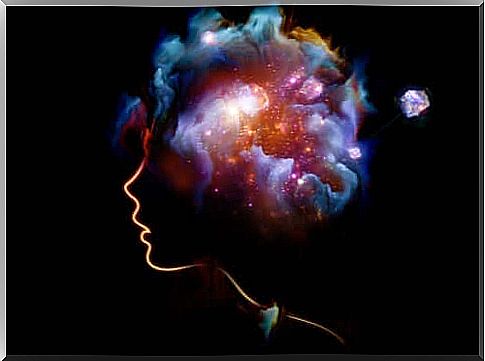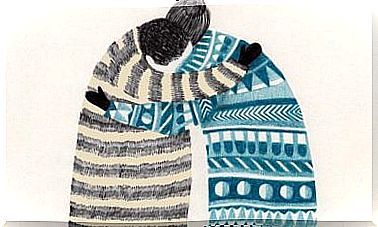Common Cognitive Distortions In Anxiety

Cognitive distortions in anxiety have a very clear purpose: to intensify suffering. The mind becomes trapped in rigid and negative thinking patterns. As a result, there is no logic or internal equilibrium, there are only concerns. The world becomes a threat and every problem, no matter how small, has no solution.
These kinds of psychological dynamics are characteristic of conditions such as anxiety or depression. Nevertheless, we should note that everyone uses cognitive distortions. For example, every individual has at one time or another thought things like, “I’m feeling quite clumsy right now, I think I’m really incompetent.”
Essentially, the mind processes certain situations in a wrong and harmful way. Most of the time, though, we try to maintain control. When we analyze reality in a calmer way, we choose to adopt a more realistic and friendly attitude.
The problem arises when it is simply not possible to be analytical and rational. In that case, everything becomes extremely complex and we are no longer able to control what is going through our minds.
In other words, our psychological resources are minimal, and that’s when we end up feeding those debilitating negative distortions.
That said, it’s important to avoid letting your cognitive distortions take over. Identifying them, learning how they work and depriving them of power is the best thing you can do.
The most common cognitive distortions in anxiety
- “I can’t stand this, it’s unbearable, I think I’m going crazy.”
- “I’m worthless.”
- “From now on, everything will only get worse, I’m sure.”
This kind of reasoning creates a kind of mental fog in which there is only room for fear. If you constantly reinforce these kinds of thoughts, you will become exhausted.
Cognitive distortions are tricks of the mind, systematic ways in which people distort information about the environment, what is happening around them, and what they perceive.
It is not easy for someone to tell why they choose to use this type of mechanism. Sometimes it is due to a feedback system between the emotions and the thoughts themselves.
Just think about it, it’s a cycle. You feel bad so you start to think negatively. As a result, you feel even worse. At other times, cognitive distortions are schemes that an individual uses throughout his life without even realizing it.
For example, a complicated upbringing or non-clingy parents can lead to a person misinterpreting things. It’s also easier to fall into these mental traps if you have low self-esteem. Here are the most common cognitive distortions associated with anxiety.

Catastrophizing
This means that you always think the worst in order to be prepared for anything. People often assume that this is a good strategy, when in reality what they end up with is that their own anxiety levels increase significantly.
Here are two common examples of this cognitive distortion: “If I don’t pass this test, I won’t be good at my career” and “I know we’ll all be fired soon and everything will go downhill.”
Dichotomous thinking
When we talk about dichotomous thinking, we are referring to any line of reasoning that begins with the words ‘always’, ‘never’, ‘everything’ or ‘nothing’. In short, it is a way of processing reality, where everything is black or white. You are for me or against me. I either do it wonderfully or terribly. This way of assigning extreme values without a middle ground leads to a lot of suffering.
Selective abstraction
Have you noticed that sometimes your attention has a distorted tendency to see the negative side of life in every situation? Selective abstraction is one of the most common cognitive distortions in anxiety.
It happens when a person only focuses on the dark side of their reality. In this way, they interpret situations in the most harmful way for themselves.
An example of this way of thinking is: “I invited everyone in the office to my birthday party but Claudia didn’t show up. I’m sure she hates me and the rest is probably here out of obligation.”
Personalization, one of the other common cognitive distortions in anxiety
- “My boss is arguing with someone in the office. It must be because of something I did wrong.”
- “The cashier was rude to me. It’s probably because I’m just not likable.”
- “My girlfriend did poorly in the test. This is my fault, I could have helped her better. I am a terrible girlfriend.”
This type of reasoning is the result of the negative internal dialogue that individuals use to personalize each fact and act as if they were entirely their responsibility.

Arbitrary conclusions
Fear tends to make people believe they are the Oracle of Delphi. If you’re anxious, you know it’s easy to take on the role of a fortune teller in many different situations.
The most common are, for example, that you think you are 100% sure of what others think of you. So much so that your mind won’t stop torturing you with thoughts like “he thinks I’m a loser” or “she’s just my girlfriend out of pity.”
Likewise, it is common to fall into the trap of ‘seeing the future’. You tell yourself that you are not going to do something right, that everything is going to go bad for you, and so on.
In short, learning about the most common cognitive distortions in anxiety gives you two powerful tools. First , it allows you to discover these thought patterns that make you uncomfortable. Second, you are able to realize how the human mind works and how it can become your worst enemy if you don’t set limits.
Learn to take care of your mind. After all, it is the place where thoughts, reason, emotions and even chaos arise.









